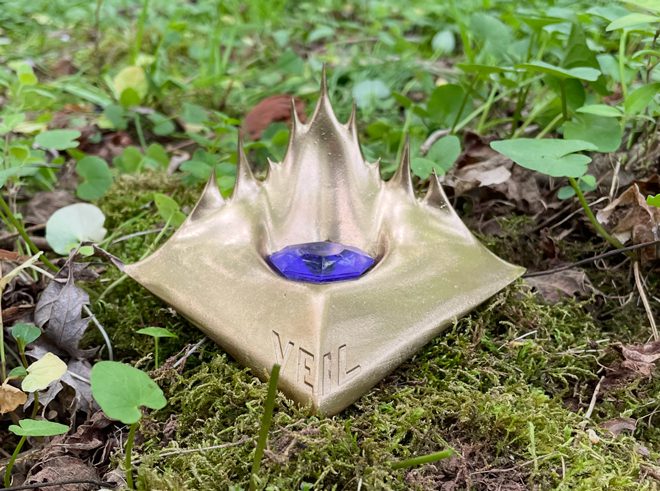Deep in the pines of Wharton State Forest, in a lonely stretch between Tuckerton Road and the Batona Trail, treasure hunters combed the ground, looking for a prize worth thousands. It was August, and the Veil treasure hunt was in its final days. When the totem was eventually discovered, the winner, who spent weeks puzzling out a series of clues in order to get to the right spot, claimed a prize of $4,130.
The Veil treasure hunt is the brainchild of Jeff and Paul DuVilla, brothers from Hammonton who became hobbyist treasure hunters after both had children.
“We participated in a few treasure hunts over the years that were cool,” Jeff says, “but ultimately didn’t really hold our interest. Most often, it’s like one long riddle or a hard-to-read map, and the treasure could possibly not be found for years. It’s easy to lose interest.”

The pair decided to create their own treasure hunt, aiming to “gamify the world around us, the past, the present, the future, and to ultimately use it as a way to get people to explore the outdoors and our parks at a time when our parks need as much love as they can get,” Jeff says.
Hunt participants sign up at their website, findveil.com, and get access to daily clues in the form of photos, videos and riddles. The website also shows a map with a search radius. At first, it can span across a whole state. By the last days of the hunt, the circle shrinks to just a mile or two. The first Veil hunt began in March, and since then the brothers have hosted four more.
In addition to the pine barrens, Veil treasures have been found on the Watchung Reservation in northern New Jersey, in Evansburg State Park near King of Prussia, and in New York’s Central Park and Philadelphia’s Fairmount Park. Participation has grown steadily, and the most recent hunt grew to include more than 2,000 participants.
The history of treasure hunting goes back centuries, but interest in the modern version of the hobby began growing when a Santa Fe art dealer named Forrest Fenn announced that he’d hidden a chest of gold and jewels somewhere in western United States. In his 2010 book, Fenn published a poem that contained all the clues a hunter should need, he said, to locate the cache. In the decade it took for the treasure to be found in the Rocky Mountains, Fenn’s quest made headlines again and again.
“The way our game works is our hunts are designed to last between two and three weeks,” Jeff says. “It’s a short duration, so you know it’s going to be found. That circle is going to narrow every day. We have a trail camera looking at the treasure, so everybody sees the exact minute it’s found and nobody ever feels like they’re searching for something that might have been discovered weeks ago.”
And the best part, he says, is that Veil gets people out into nature, and helps them learn about the area.
“Unlike other treasure hunts where you’re just trying to solve a code, ours takes you to real places,” Jeff says, “and the clues help you learn about the area, the history and the geography along the way. You feel like you’re getting something out of it, whether or not you find the treasure.”
Veil offers people a way to have an adventure close to home, but it’s also drawn in others, says Paul.
“A lot of our players don’t even live near here,” he says. “We have someone who flew in from Wyoming and someone who drove from Tennessee. We have another person who drives from Maine to just come and search for a couple days and then explores the area.”
For the next hunt, expected to start in September, the DuVillas are trying something new. “We’re launching a themed hunt this time,” Paul says. “It’s going to be called The Search for Project Lyra.”
Unlike previous rounds, the new one is designed to play out with a storyline.
“It’s about how an energy canister fell off a secret government plane, and we’re trying to find it before our adversaries do,” Paul says. “It’s a little less about history – although there will still be elements of that – and really about having an awesome, gamified experience.”
The brothers are tight-lipped about where the treasure (a totem to be traded for a check) will be hidden, but it’ll be somewhere in New Jersey, New York, Pennsylvania or Delaware. “Sometimes they’re very deep in the woods – the one in Wharton was really out there,” Jeff says. “But then some are literally right next to a path people walk their dogs on every day.”
The brothers front the initial prize amount for each hunt. For the upcoming game, the pot will start at $2,500 and increase as people spend $20 to sign up.
Veil’s ultimate aim, Jeff says, isn’t to hand out money, but to create a memorable experience.
“This is something very much out of the norm for most people,” he says. “One of our challenges is getting people who’ve never even thought about doing anything like this interested. Only one person will win and find the treasure, but everyone’s going to have fun trying.”














